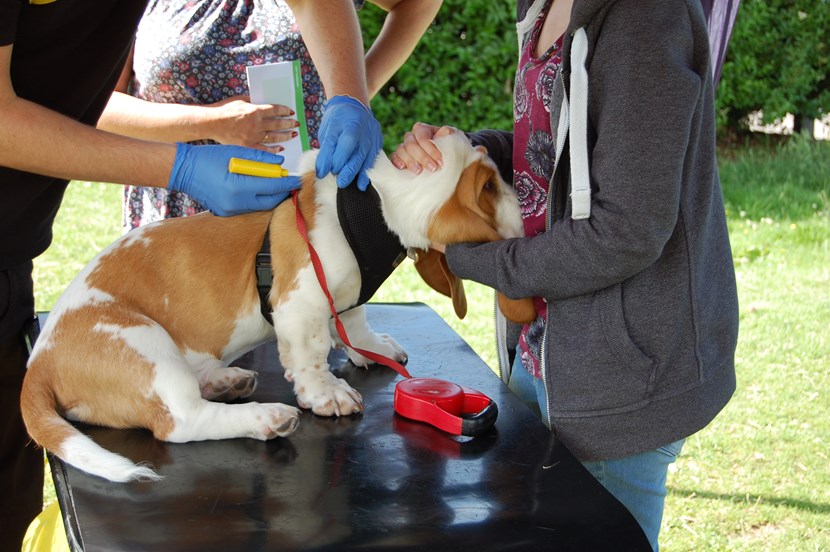
24 Mar 2016
Owners urged to take action ahead of dog microchip law change
Owners can avoid the doghouse by microchipping their pet ahead of the law changing next month.
From 6 April 2016 all dogs over eight weeks old must be microchipped and the details stored on the microchip database must be up to date.
Leeds City Council is calling on all dog owners and breeders to ensure their dogs are chipped if they aren’t already and to check correct details are registered with the appropriate microchip database.
If not, the law gives the council new powers to issue notices ordering owners to microchip their dogs.
Although the law changes on 6 April 2016, the council will not be using the new enforcement powers for the first few months to help raise awareness and give owners time to take action.
Throughout this three month grace period, anyone the dog wardens speak to in the course of their work will be advised to get their dog chipped.
While the wardens already scan found dogs, any dog they come into contact with in the grace period, will be scanned for a microchip. If the dogs are not chipped the wardens will offer to arrange this for owners.
If the offer is declined, the new enforcement notice will be issued.
The legal notices give owners 21 days to take action. If dogs still are not chipped after this period, owners could face a £500 fine.
The council will also have powers to take dogs from owners to microchip them and pass on any costs to the owners.
Failure to pay the fine or not allowing wardens to microchip dogs could result in prosecution and a criminal conviction.
Dog wardens have been working with the Dogs Trust for some time to offer free microchipping. Vets can also microchip dogs.
Nichola Smith, dog warden, said:
“Anyone who has looked at our Leeds found dogs Facebook page recently will see that we’re still picking up dogs that aren’t microchipped or if they are, we can’t contact their owners as the details are out of date.
“By making microchipping compulsory, hopefully owners will be encouraged to take action. If the worst should happen and a dog strays or is lost, we’ll be able to identify them and happily reunite them with their registered owner much more quickly.”
Details of dogs picked up by the wardens are posted on their Facebook page.
Councillor Mark Dobson, executive member for environmental protection and community safety, said:
“We want to work with people to help them keep on the right side of the law.
“Dog wardens along with their colleagues at the Dogs Trust have been offering free microchipping ahead of the law changing next month.
“To give people an extra opportunity to get their dog microchipped or check the details are up to date, we won’t be issuing legal notices to enforce the law for three months.
“It’s in the owners and dogs best interest if a dog is microchipped so I’d encourage anyone with a dog or thinking about getting a dog to make sure it is chipped and that they’ve registered the right details.
“After our initial grace period, people will have had fair warning and we will have to enforce the law.”
Microchips are about the size of a grain of rice and are inserted into the loose skin between a dog’s shoulderblades with a sterile needle. Implanting the chip will feel like a standard injection for a vaccination.
Making microchipping compulsory will help ensure lost or stolen dogs can be identified and reunited with their owners.
All puppies over eight weeks old must now be chipped so they can be traced back to their breeder.
If selling your dog or giving it to a new owner, the dog must be microchipped before you do so. It’s up to the new owner to ensure their contact details are registered.
Some database operators are offering to make changes to registered keepers free of charge ahead of the change coming into effect.
MICROCHIPPING FACT FILE
From 6 April 2016 dogs over 8 weeks old must be microchipped.
The only exclusions are dogs that are certified by a vet to be a working dog or where a vet provides a certificate for the duration of a dog’s illness stating that it cannot be chipped for health reasons.
Details that have to be registered include:
- Full name and address of keeper, and telephone number(s)
- Dogs name, sex, breed (or description), colour, date of birth (or accurate estimate)
- License details for breeders if the breeder is also the dogs’ keeper. Also need to state which local authority the breeder is licensed by.
If the microchip database doesn’t hold this information, or the information isn’t up to date, the dog may be regarded as not microchipped and subject to enforcement.
No keeper may transfer a dog to a new keeper until it has been properly microchipped.
Where a dog is transferred to a new keeper, the new keeper must record their full name, address, telephone number and change of dogs name (if applicable) with the database.
For media enquiries contact:
Leeds City Council Communications team
communicationsteam@leeds.gov.uk